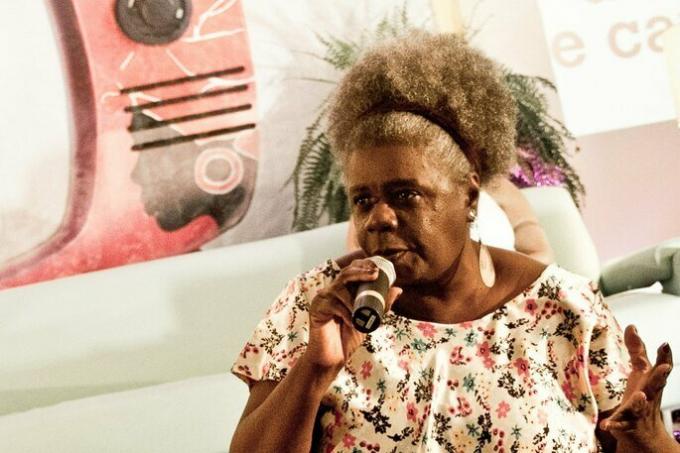Conceição Evaristo is an important Brazilian writer. His short stories, novels, poems and essays deal with issues related to ancestry and Afro-Brazilianity.
Born in Belo Horizonte (MG) in 1946, Conceição came from a humble family and worked as a maid until 1971. Two years later she moves to Rio de Janeiro, where she graduates in Literature from UFRJ.
In 1996 she became a master in Literature at PUC/RJ with the dissertation Black Literature: a poetics of our Afro-Brazilianness. In 2011 she completed her doctorate at UFF with the thesis Malungos Poems – Songs Brothers.
She entered the literary scene in the 90s, when she began publishing her texts in the series Black Notebooks, publication by Grupo Quilombhoje.
In addition to being a writer, Conceição also worked as a teacher at Universities and institutions in Rio de Janeiro, Bahia, Rio Grande do Sul and Minas Gerais.

Books by Conceição Evaristo
- Ponciá Vicencio (2003) - Romance.
- Alleys of Memory. (2006) - Romance.
- Poems of remembrance and other movements. (2008) - Poetry.
- Unsubmissive tears of women. (2011) - Stories.
- Water eyes. (2014) - Stories.
- Stories of slight mistakes and similarities. (2016) - Short stories and novel.
- Big boy lullaby. (2018) - Soap opera.
Importance of his work and main themes
The importance of Conceição Evaristo's literature is due to the fact that it takes a critical and sensitive stance in relation to the history of black people in Brazil. This positioning is already revealed in his debut novel and most famous book, Ponciá Vicencio.
Her writing has great relevance for Brazilian cultural formation and led her to receive the title of Literary Personality of the Year by the Jabuti Prize, in 2019.
The themes he addresses are related to his life experiences, as they deepen reflections on racial discrimination and class and gender inequalities, bringing a powerful portrait of a large part of the Brazilian population.
Because of this, Conceição created the term "writing" to define this writing that emerges from everyday life, from common everyday events, loaded with personal and collective memories of its people.
Phrases and poems by Conceição Evaristo
From the girl, the kite
From the girl to the kite
and the ball
and when your intimate
skin, soft silk, played
in the open sky of the street
a rough string,
muscular, cruel
broke the thin line
of girl butterfly kite.
And when the paper
frayed silk
girl's
shattered between
the sidewalk stones
the girl rolled
between the pain
and abandonment.
And then, always torn apart,
the girl kicked her out
a bloody doll
who sank in a bathroom
any public.
Our writing cannot be read as a bedtime story for those in the big house, but rather to disturb them in their unfair sleep.
The Brazilian imagination, due to racism, cannot recognize that black women are intellectuals.
I also like to say that writing is for me the dance-singing movement that my body did not perform, it is the password by which I access the world.
The night does not fall asleep in women's eyes
The night doesn't sleep
in women's eyes
the female moon, similar to ours,
in attentive vigil watchman
our memory.
The night doesn't sleep
in women's eyes,
there are more eyes than sleep
where tears suspended
commemorate the lapse
of our wet memories.
The night doesn't sleep
in women's eyes
open vaginas
retain and expel life
whence Ainás, Nzingas, Ngambeles
and other moon girls
keep them and us away
our cups of tears.
The night will not sleep
never in the eyes of females
because of our woman-blood
of our souvenir liquid
in every drop that flows
an invisible and tonic thread
patiently sew the net
of our ancient resistance.
Maybe you will also be interested:
- Greatest contemporary Brazilian poets
- Brazilian Black Personalities
AIDAR, Laura. Conceição Evaristo: life, work and importance in Brazilian literature.All Matter, [n.d.]. Available in: https://www.todamateria.com.br/conceicao-evaristo/. Access at:
See too
- 17 greatest contemporary Brazilian poets
- Brazilian Black Personalities
- Cora Coralina
- Machado de Assis: biography and works
- Carolina Maria de Jesus
- Manoel de Barros
- 23 important women in Brazilian history
- 5 poems to reflect on Black Consciousness

